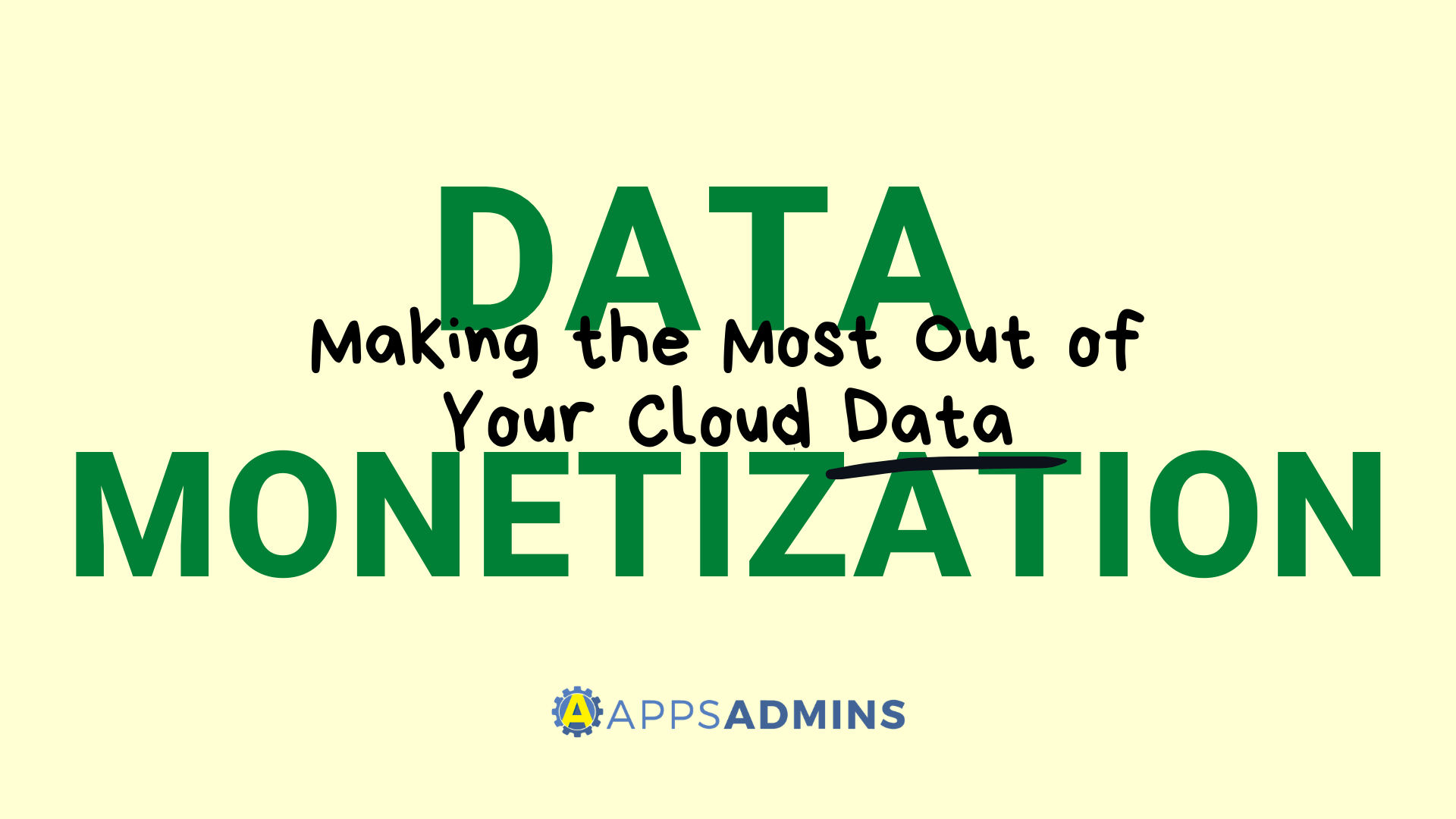G Suite Business Free for 30 Days
Sign up for a Free 30 Day Trial of G Suite Business and get Free Admin support from Google Certified Deployment Specialists.


Data has become the currency of the modern world. With the right data strategy, forward-thinking companies can disrupt their industries, transform the way they operate, and delight their customers. Of course, translating data into valuable and lucrative actions isn't always as simple as it seems.
In an era where knowledge is power, it's no surprise that data can drive business wealth, but data monetization isn't something that simply happens naturally when you're presented with the right information. It's what you do with the information available to you that counts. According to data experts, the businesses that are most progressive in this area are the ones that know how to think critically about the information they collect, process, and share.
Although the concept of data monetization may not be entirely new, most companies are still in the early days with their information strategies. Fortunately, there are new tools emerging in the market all the time, like Google Data Studio, which can give today's business leaders a better overview of their digitally-transforming landscape.
To help you make your first tentative steps into the world of data monetization, we've put together a list of 7 steps any business can take to make the most out of their data.
Step 1: Create a Plan for Data Management
For any data strategy, the first and most important thing a business will need is a plan. How are you going to collect your data? Will you be gathering customer conversations and analytics on Google cloud? Do you have a system in place for ETL information and analytics in your network? Once you have your data, how will you arrange it into a format that you can work with? Will you be using BigQuery with built-in machine learning for your warehousing needs, or do you need something more customized?
The easiest way to ensure that you're on the right track with your data solution is to ask yourself what you want to accomplish with your data analytics and monetization strategy. Some people want to reduce the risk of data leaks, while others simply need to learn more about their target audience. Ask yourself:
-
How will you collect and secure your data assets?
-
What will you do with your data once you have it? Do you need a data processing system in place?
-
Who are your data customers, and where are your options for data monetization? Are you selling your data insights, or using them to make your own business more lucrative?
-
How will you prepare, transform and send the data into your analytics pipeline?
-
What additional technology do you need besides storage? Would you benefit from virtualized environments, cloud composers, or machine learning tools?
Step 2: Decide Where your Data Will be Coming From
Data is everywhere in the modern business landscape. Every time you complete a task within your TPU, finish a transaction, or just engage in a conversation with a client, you're building more data for your system. While it's tempting to simply capture as much of that information as possible, the truth is that you'll only need certain kinds of data to get the results you need for data monetization. Before you start using sources like Google's Cloud Datalab to explore and visualize the data sets that are most important to your business, you'll need to decide where you're going to be collecting your information from.
If you've already start to collect data over the years, then you might need to migrate certain information into a new data pipeline to give you a more comprehensive overview of your business. Fortunately, in today's digital landscape, cloud-based and virtualize computing systems make it much easier for organizations to create their ideal data production pipelines. To get the maximum value out of your strategies, you may need to explore ways to connect your data pipelines directly into your warehouses and analytics systems. The right cloud data warehouse provider, such as Google allows business leaders to create an asset of pipelines that they can even connect to other third-party environments like hosted ad networks and point of sale environments too.
Step 3: Build a Strategy for Ingesting and Managing Large Data Sets
Today's companies are inundated by data, and the more technology evolves, the more our consumption of information continues to accelerate. As consumers look for new ways to interact with businesses, and organizations find additional data sets to support their customer experience strategies, it's no wonder that the most forward-thinking data monetization strategies need to be prepared to handle huge amounts of data.
Forward-thinking companies will need to integrate solutions for data streaming that can handle a wide range of sources as quickly and effectively as possible. Solutions like Cloud Pub/Sub from Google give businesses a way to ingest event streams from any environment at any scale at a rapid pace. What's more, because solutions like Pub/Sub come with simplistic payment models, you only pay for the amount of processing power that you're using for your data framework.
Step 4: Implement Auditing for Compliance Purposes
Just because data is more available today doesn't mean that companies necessarily have the freedom to use it however they like. There's also an expectation in today's environment for people to create compliant and regulation-ready data management solutions that comply with data obligations. There are rules for how any business can successfully access and monetize the data available to them in today's ever-changing industry.
For instance, government agencies may need data consumers to abide by specific policies for data usage, or they may require them to sign data-usage agreements through specially-designed applications. It's possible for today's data-infused companies to invest in support from a company that can provide them with auditing solutions that ensure that they remain in charge of the way that their data is used. There are also plenty of products that give businesses a way to track how their data applications are performing. For instance, Google recently introduced the Firebase performance monitoring center for companies that need to make sure that their applications are performing effectively form a consumer point of view.
When you're striving for successful data monetization strategies, make sure that you have a plan in place for how you're going to comply with everything:
-
Secure storage solutions - Make sure that your data can be safely stored within specific locations that abide by the restrictions set in your geographical area.
-
Encryption - Look for methods of incorporating encryption to your data sets both in transit and at rest to prevent the exposure of sensitive information during an unexpected security breach.
-
Access control - Make sure that you have complete control over who should have access to specific sensitive pieces of data within your workplace.
Step 5: Make Sure Your System is Extensible and Scalable
As we mentioned above, as new technologies and trends enter the world of big data, the way that we manage and monetize information is bound to change. With that in mind, it's important to make sure that any data strategy you set up is well-equipped to handle potentially unexpected changes in volume and requirements. Emerging data products are increasingly dependent on the ability to process huge amounts of data at once, and your system architecture needs to be provisioned to support this.
The fact that data monetization needs to be a scalable process is one of the reasons why so many business leaders are turning to cloud solutions for their strategy. Conventional hardware systems are specifically designed to address certain performance needs, which means that it's hard to adapt at an agile pace. Additionally, scaling your system from a hardware perspective is very difficult from a cost perspective.
Rather than struggling with the process of building a commodity-based computing system on-premise, consider experimenting with the potential of the Google cloud. Cloud PaaS systems like the Google Data Studio provide you with far more control over your data monetization strategy, as well as endless ways to adapt your campaigns according to your changing needs. Because the cloud is inherently scalable, you can unlock the true power of your data one interactive dashboard at a time, configuring and setting up virtual clusters within a matter of moments.
Additionally, Google's pricing approach of "pay for what you use" means that you won't have to spend an unreasonable about on hardware and data management labor when you're still just getting started with your data monetization strategy. Instead, you can simply grow and adept at the same pace as your data warehouse.
Step 6: Consider Your Options for Data Delivery
Once you've decided what methods you're going to use to collect and analyze your data, "monetization" will require your team to think about how you're going to deliver that data to your customer. In the past, delivering data used to mean producing a data extract which was then delivered to a client. After files were transferred, it was up to the customer to load the information, verify the data being shared with them, and then move the data into a usable format.
Now, with systems like Google's Cloud Data prep, businesses can make sure that the data they're offering to customers is available and ready for use. The modern data solution provider should be able to streamline the insights they deliver to their clients using updated methods of delivery. Depending on what you plan on delivering to your client, you may even need to ensure that the data sets you provide are available to tinker with or adjust according to individual company needs.
The Cloud DataPrep solution created by Google and Trifacta gives organizations an intelligent and immersive service that they can use for visually exploring, preparing and cleaning data that's both unstructured and structured, making it ready for analysis. Cloud DataPrep is completely serverless and available to work at any scale, and like with many of Google's solutions, it's a managed service. That means that there's no infrastructure to deploy or handle.
Step 7: Trust in a Reliable Cloud Partner
Investing in a data monetization strategy can be a highly profitable and engaging venture for any company. However, it's worth noting that there's often a lot of effort and focus involved in building a data warehousing and analytics environment that's equipped to properly ingest, manage and process the high-velocity data sets that businesses deal with today.
A cloud partner like Google gives your company immediate access to all the skills and support it needs to design and operate an effective data warehouse, regardless of what your existing resources may include. With Google, you can take a completely "managed" and serverless approach to your data monetization strategy, accessing insights from data sets using a scalable and efficient solution built on Google's proven end-to-end solutions for analytics. Google's strategy, including everything from BigQuery to DataProc, removes the complexities involved with standard data monetization practices so you can discover the power of data once and for all.
Need help with your Migration or Remote IT service? Reach out to Apps Admins today to find out more about starting your path to data monetization. Our Cloud-Support and Services start at $399.00/monthly subscriptions.
.jpg?width=818&name=appsadmins-svg-rules-1%20(2).jpg)








